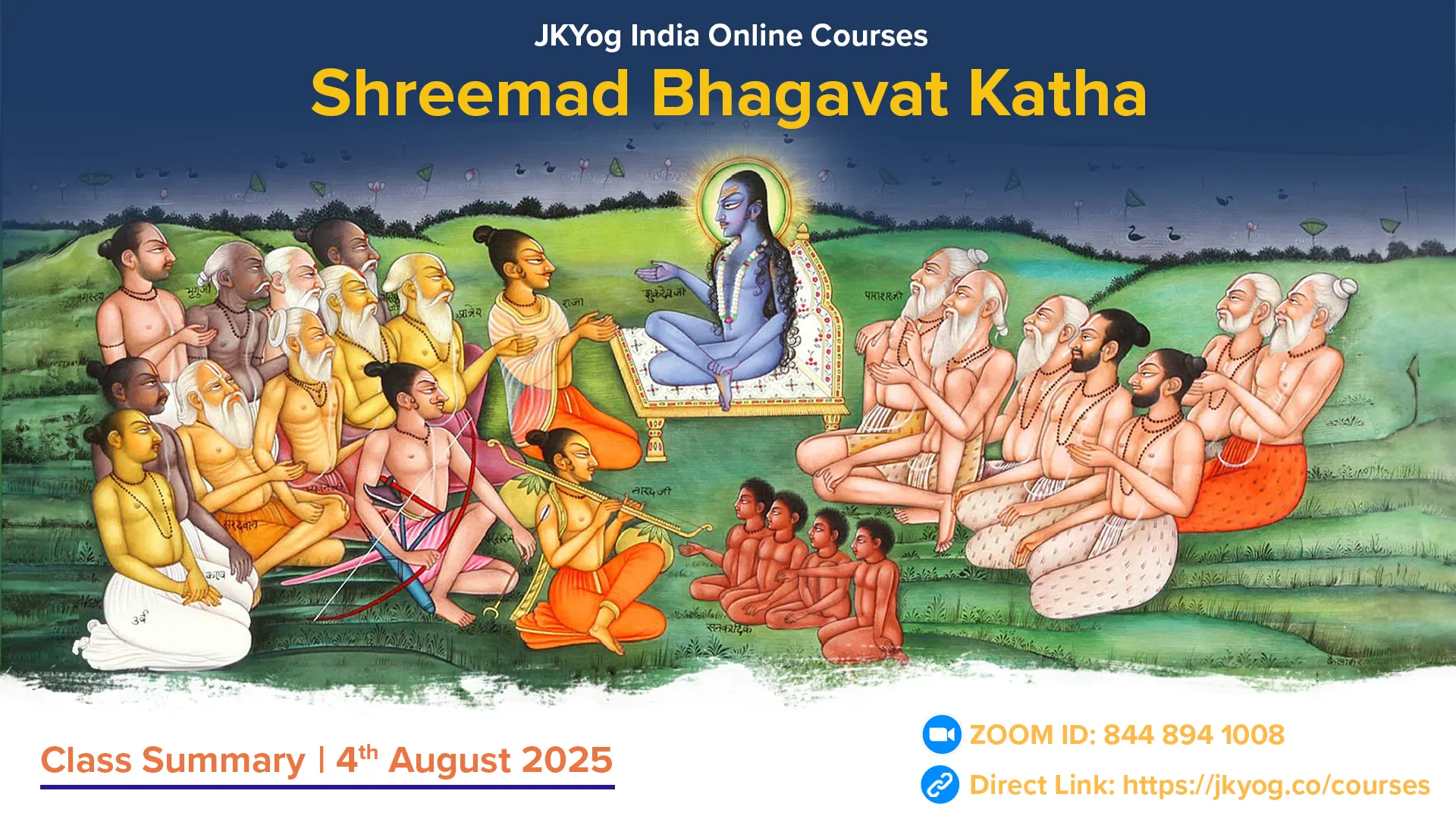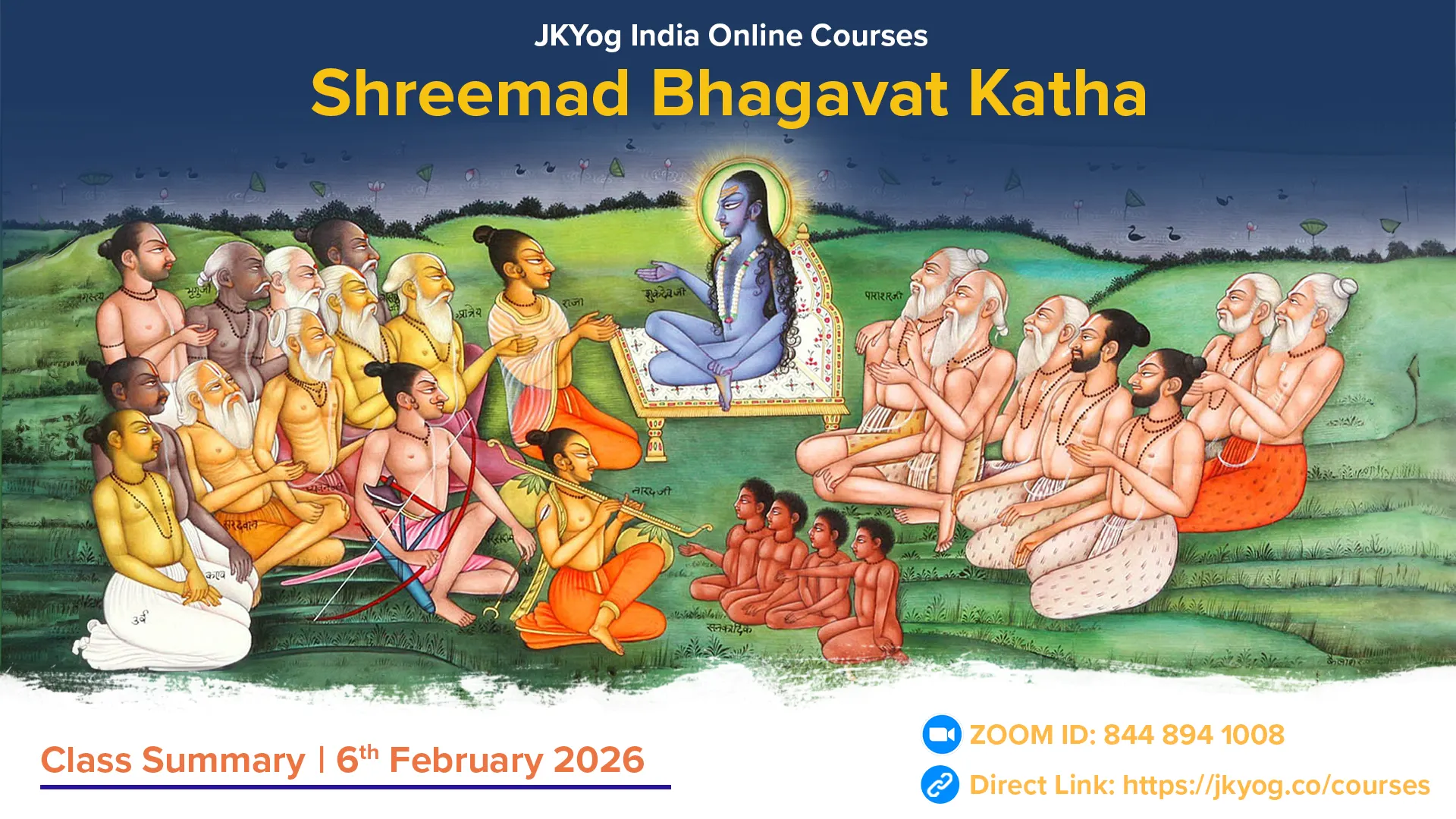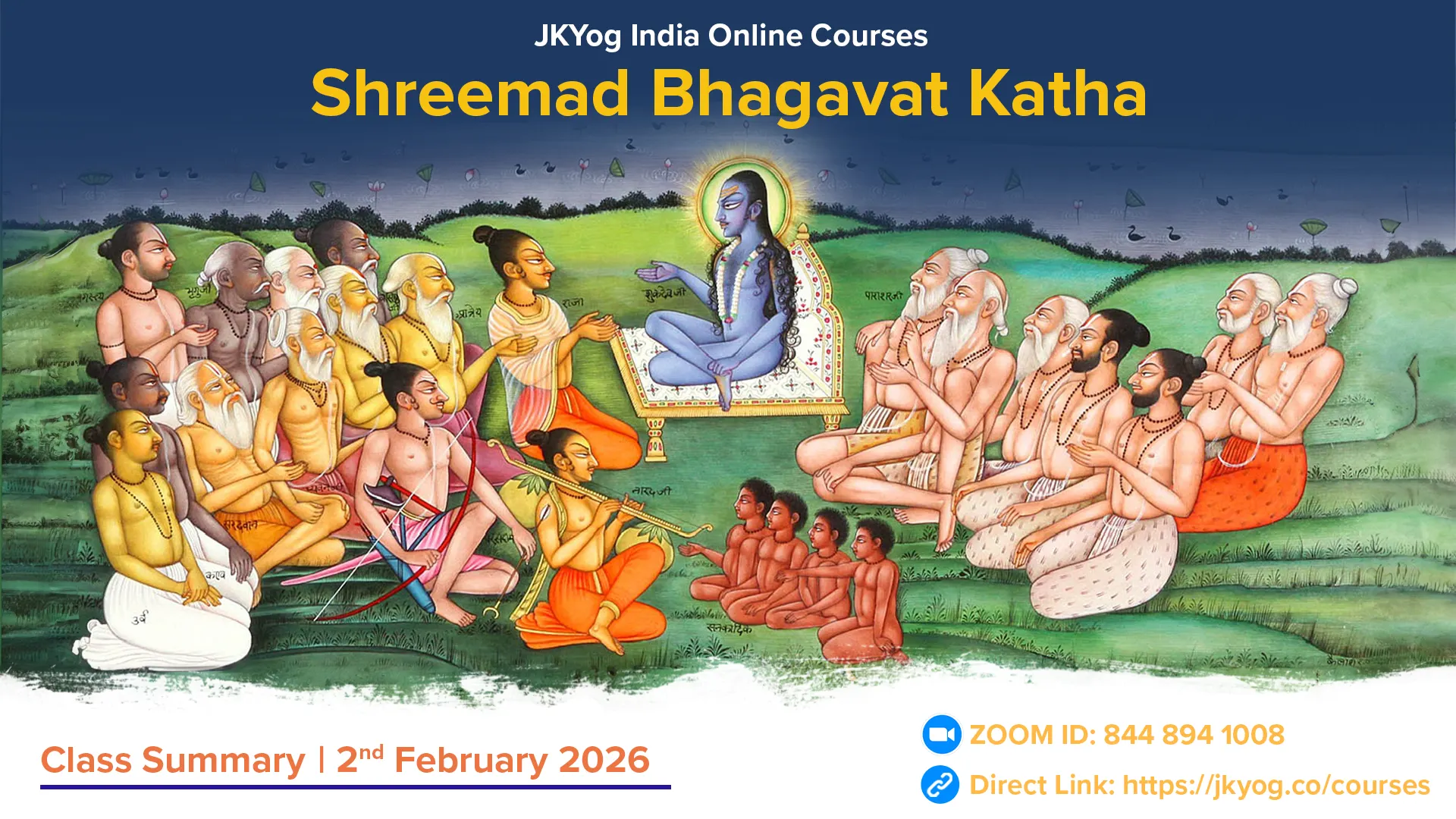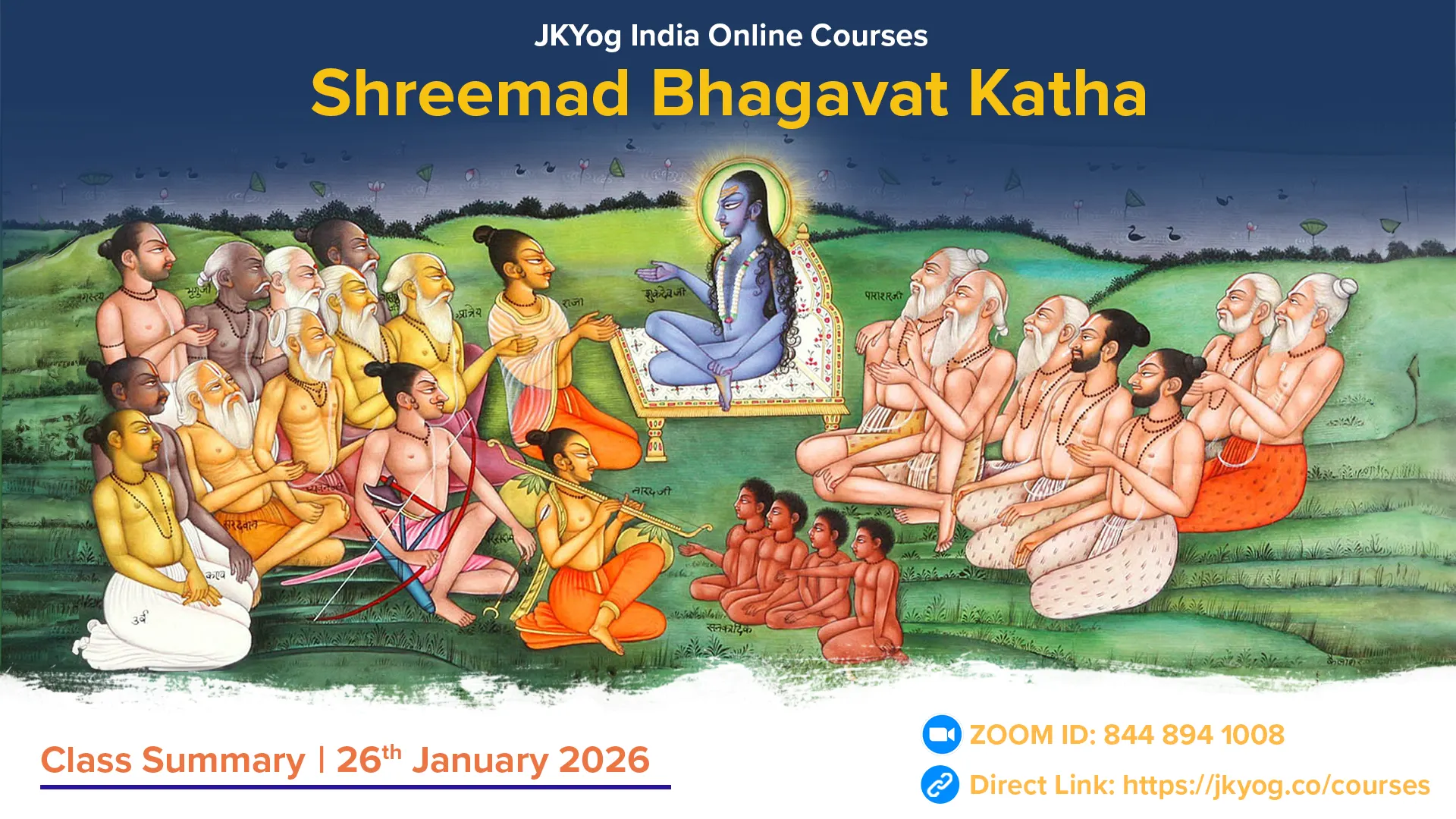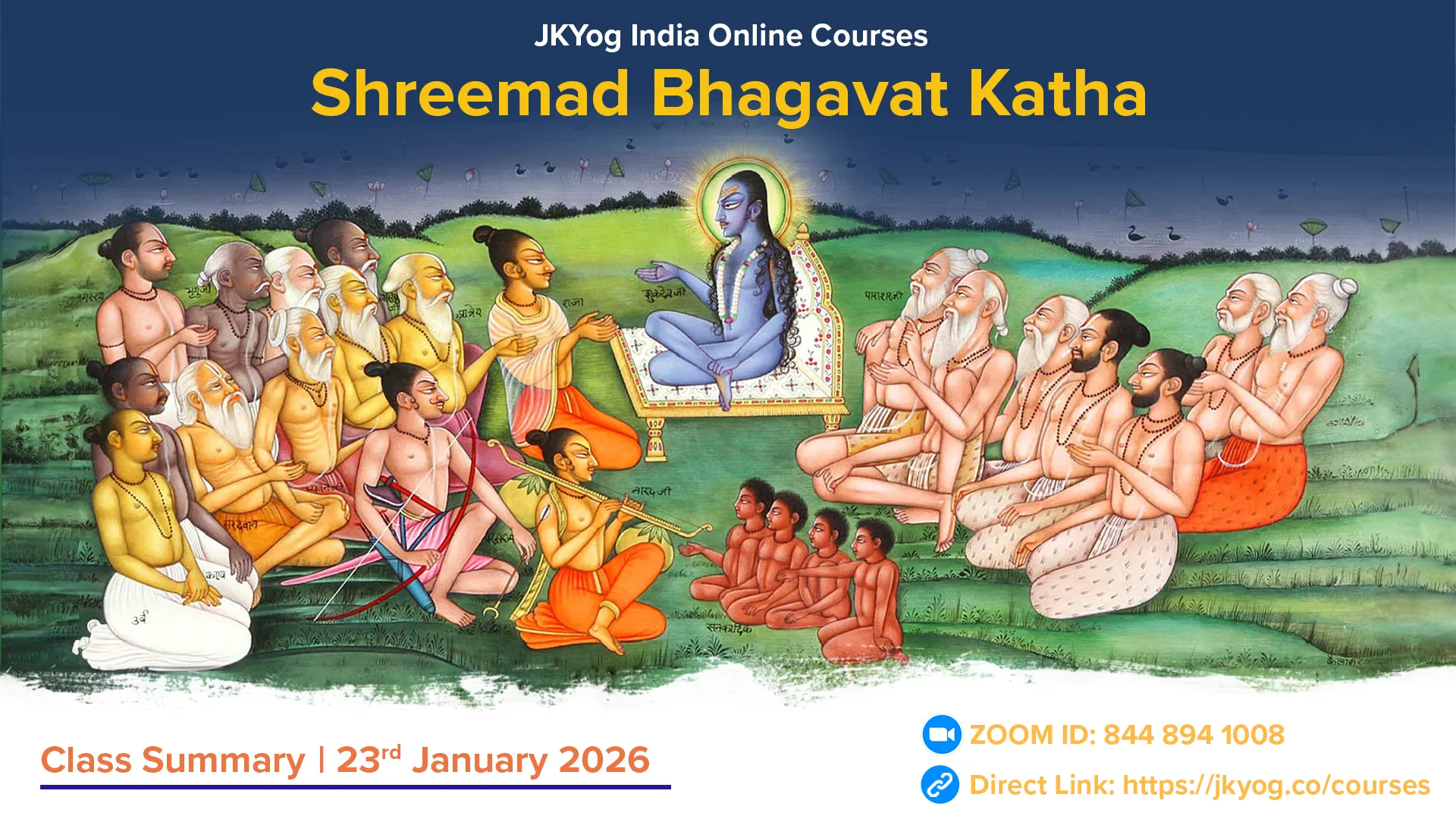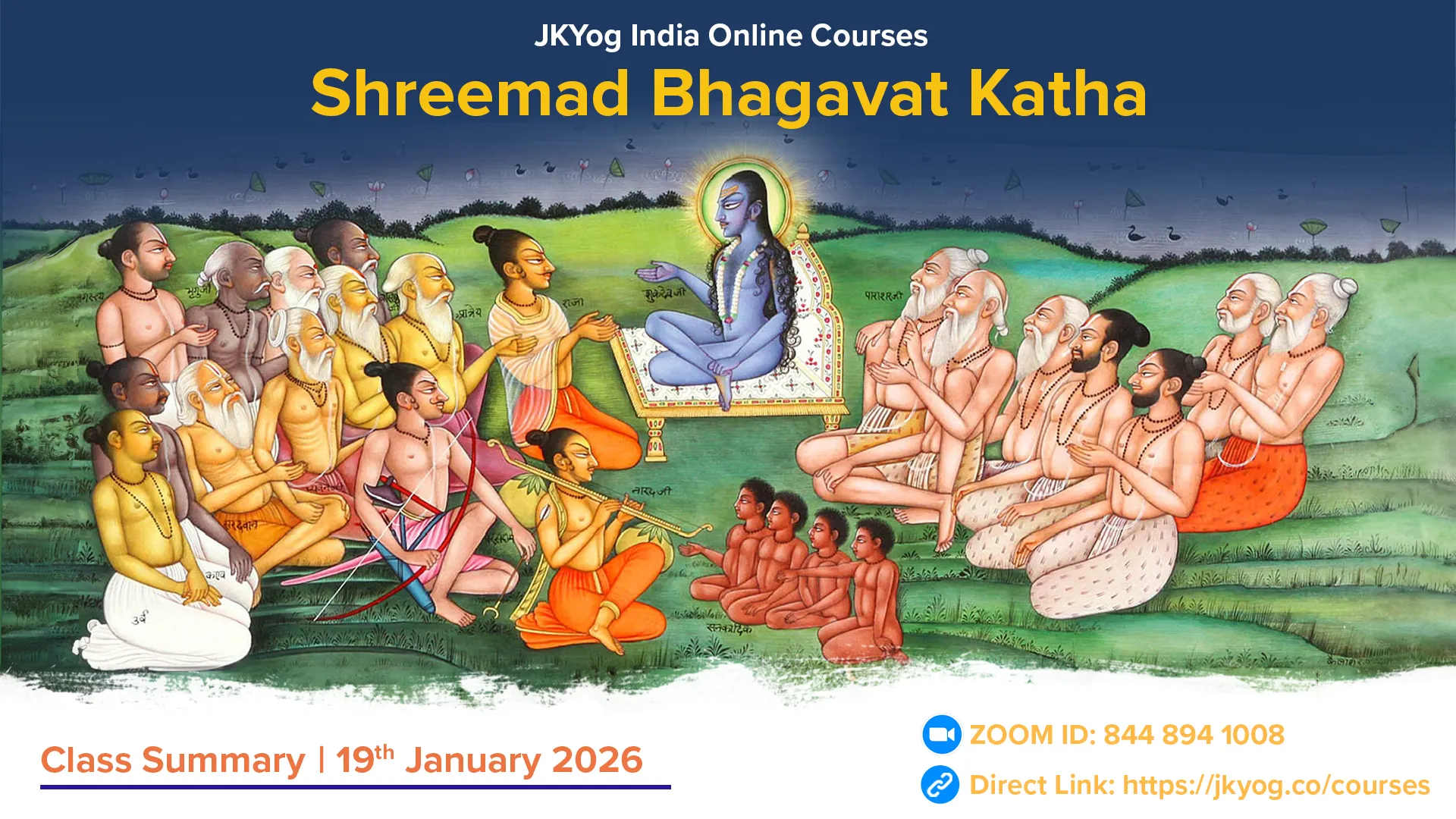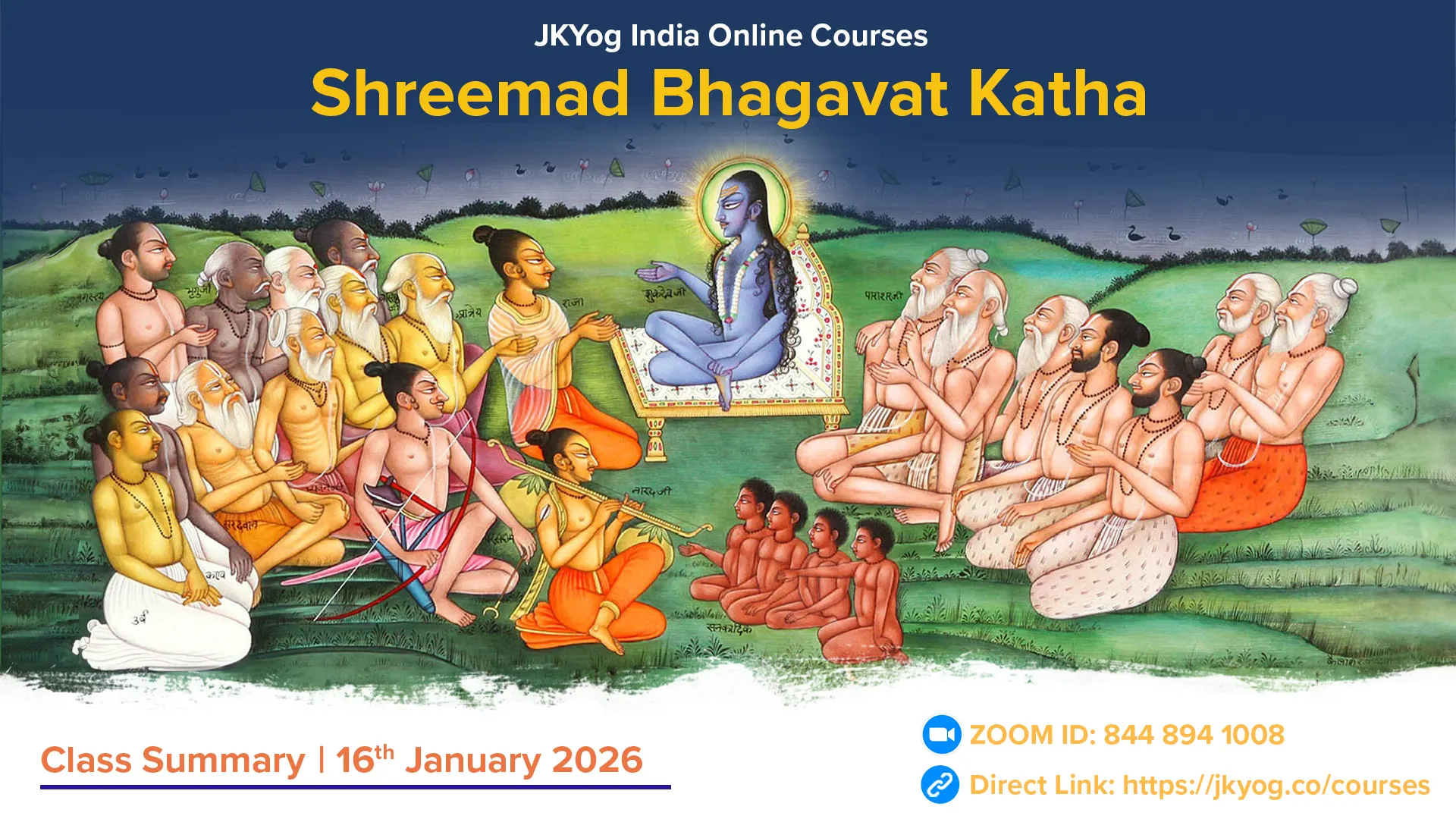Shreemad Bhagavat Mahapuran- Canto: 9, Chapters: 4-5
The Story of Naabhaag and Bhagwan Rudra
Manu had a son named Nabhaag, and Nabhaag had a son named Naabhaag. In his youth, Naabhaag observed celibacy (brahmacharya) for an extended period. When he eventually returned home, his elder brothers had already divided their father’s entire property amongst themselves.
When Naabhaag asked them, “What share is left for me?”, they replied, “You spent your time in celibacy, so the only thing left for you is our father himself.”
Naabhaag went to his father and said, “Father, my brothers have given me nothing except you.”
The father replied, “Son, do not listen to them. I will tell you a way, listen carefully. Some Brahmins of the Angiras lineage are performing a great yajna. However, every sixth day, they make an error in the procedure. Go to them and recite two specific mantras called Vaishvadeva. When the yajna is completed and they ascend to heaven, they will give you all the wealth left from the ritual.”
Naabhaag did exactly as instructed. The Brahmins, pleased with him, gave him all the wealth that remained from the yajna and then departed for heaven.
But just then, a dark-complexioned man appeared from the northern direction and said, “Everything that remains on this yajna ground belongs to me.”
Naabhaag replied, “This wealth was given to me by the sages; therefore, it is mine.”
The dark man responded, “Let your father decide this dispute.”
So, Naabhaag went back to his father and narrated the entire incident. The father said, “Son, during the yajna of Daksha Prajapati, it was established that whatever remains from a yajna belongs to Bhagwan Rudra. So this wealth too is His.”
Naabhaag immediately returned to the dark man, who was none other than Bhagwan Rudra Himself and said, “Prabho! The yajna's remnants are Yours. That is what my father said. I was mistaken. Kindly forgive me.”
Bhagwan Rudra was pleased and said, “Your father has spoken according to Dharma, and you too have spoken the truth. You already understand the meaning of the Vedas. Now I shall grant you the knowledge of Brahman.”
Then Rudra Bhagwan said, “This wealth that remains from the yajna, I now give it to you.” Saying this, Bhagwan Rudra disappeared.
King Ambarish - Krishna’s Dearest Devotee
Ambarish, the son of Naabhag, was a great rajarshi, a saintly king. He was deeply religious, generous, and an exceptional devotee of Bhagwan Shree Krishna. His spiritual power was so profound that even the effects of a brahmashap (curse from a Brahmin) couldn’t touch him. He was the sovereign of the entire earth, the seven islands, and limitless wealth and prosperity.
Yet, Ambarish saw all this grandeur as momentary and part of maya. He realised that such luxuries could easily lead to sorrow and downfall. To him, only one thing held true value- Bhagwan Shree Krishna's love. His entire life was filled with Krishna.
- His mind was fixed at Krishna’s lotus feet.
- His speech glorified Hari’s divine pastimes.
- His hands were engaged in serving Shree Hari’s temples.
- His ears delighted in hearing the Bhagavat katha.
- His eyes remained absorbed in Krishna’s darshan.
- His skin rejoiced in the company and touch of devotees.
- His nose was immersed in the divine fragrance of tulsi leaves.
- His tongue relished only Krishna’s prasada and offerings.
- His feet walked the paths to holy tirthas.
- His head constantly bowed in reverence at Krishna’s feet.
He offered every action to Bhagwan, without any trace of selfishness. Despite being a king, he lived the life of a renunciate. Under the guidance of sages like Vashishtha, Gautama, and Asita, he performed many Ashwamedha Yajnas.
His subjects were so devoted to Dharma that they had no desire even for heaven, for through their king, they experienced darshan of Bhagwan and the bliss of divine pastime stories.
King Ambarish had surrendered everything; his home, family, army, treasures, jewels, all at the feet of Bhagwan. To him, everything else was false; only Shree Krishna was real. Gradually, he let go of all worldly attachments and immersed himself fully in bhakti.
Pleased with his unflinching devotion, Bhagwan Krishna appointed His divine weapon, the Sudarshan Chakra, as Ambarish’s personal protector.
King Ambarish's wife was just as devoted, righteous, and detached from worldly pleasures as he was. Once, the couple took a vow to observe the Ekadashi fast together for an entire year, solely to worship Bhagwan Shree Krishna with deep devotion.
At the end of this year-long vow, during the sacred month of Kartik, they observed a strict fast for three consecutive days. After bathing in the holy waters of the Yamuna, they performed Krishna’s puja with intense devotion in Madhuban.
Ambarish worshipped Bhagwan Shree Krishna with grandeur, offering Him divine clothes, ornaments, sandalwood paste, flower garlands, arghya (sacred offering), and performing a ceremonial abhishek (ritual bathing). He also honoured Brahmins with deep reverence, even though they were spiritually accomplished and free of material desires (siddhas and poornakam).
He served them delicious food and gifted them a staggering 60 crore cows, all beautifully adorned. These cows had golden-tipped horns, silver-plated hooves, were gentle, gave abundant milk, and each had a calf. Along with each cow, the entire set of equipment for milking was also given.
When everything was complete and King Ambarish was about to break his fast, Sage Durvasa appeared as an unexpected guest. Ambarish immediately rose to greet him, offered him a seat, and humbly invited him to partake in the meal.
Durvasaji agreed and said, “Let me bathe first.” He then proceeded to the Yamuna riverbank for a ritual bath and meditation.
Now, a dilemma arose; there was very little time left before the dwadashi tithi (the proper time to break the fast) would end. The king found himself in a deep moral conflict:
- If he delayed breaking the fast, he would violate the vow and lose the spiritual merit of the Ekadashi vrat.
- But if he ate without serving his guest first, it would be a serious breach of atithi satkaar (hospitality towards a guest), especially a sage like Durvasaji.
Upon consulting learned Brahmins, it was advised, "The Shrutis declare that drinking water is considered both as eating and not eating."
So, meditating on Bhagwan with a pure heart, Ambarish drank only water, neither fully breaking the fast nor violating his duty to the guest. Thus, he upheld both Dharma and devotion without compromise.
When Durvasaji returned and saw that King Ambarish had broken his fast by sipping water, he became extremely furious. His brows furrowed, his body trembled with rage, and in a thunderous voice, he rebuked Ambarish, “How arrogant you are! You ate without feeding your guest first? This is a grave insult to me. Now suffer the consequences of your offence!”
In his fury, he tore out one of his matted locks and from it created a terrifying demoness (Kritya). She was blazing like the fire of destruction, wielding a sword, and charged at King Ambarish with frightening speed. The very earth trembled under her stomping feet.
Sudarshan Chakra Defends Ambarish, Durvasa Flees Across the Universe
But King Ambarish remained utterly unmoved. He did not flinch, nor did he step back. Calm and composed, he stood firm.
God had already appointed His Sudarshan Chakra for the protection of His devotee. Like fire incinerating a venomous serpent, the Chakra instantly burned the Kritya to ashes.
When Durvasaji saw that the demoness had been destroyed and now the Sudarshan Chakra was hurtling toward him, he panicked. Terrified for his life, he began to flee.
The Chakra pursued him relentlessly, Durvasaji running ahead, the Chakra close behind. He darted into the caves of Mount Sumeru, raced through earth, sky, netherworld, heaven, the oceans, and to the guardians of various realms, but nowhere could he find refuge. The Chakra followed him everywhere.
Exhausted and desperate, Durvasaji reached Brahmaji and pleaded, “O Bhagwan! You are the creator of all. Please protect me!”
But Brahmaji folded his hands and said, “When my lifespan ends and the Supreme Being winds up this universe in His form as Time (Kaal), with just a twitch of His brow, this entire cosmos, including my world, will dissolve. I, Shankarji, Daksha, Bhrigu, the Prajapatis, the Lords of beings and gods—all of us are bound by His laws and act only under His command. We are not capable of protecting someone who has offended His devotee.”
Durvasaji then went to Kailash and prayed to Mahadev for protection.
Shivji said, “Durvasaji, I, Sanatkumars, Narad, Brahmaji, Kapildev, Marichi, and other all-knowing sages, none of us truly comprehend Bhagwan's maya. We are all enveloped by it. This Chakra is the weapon of that very Supreme Lord of the universe. It is beyond our control. Only He can offer you protection. Seek shelter at His feet alone; He alone will bring you peace and salvation.”
When Bhagwan Declared - "I Am Under the Control of My Devotee"
Completely worn out, hopeless, and gripped by fear, Durvasaji finally reached Bhagwan’s divine abode, Vaikunth. The flames of the Sudarshan Chakra still scorched him as he trembled and fell at the feet of Bhagwan.
With great humility and anguish, he prayed, “O Achyuta! O Infinite Lord! I am guilty before You. I insulted Your dear devotee, Ambarish. Please forgive me. You are the Ocean of Compassion; just the chanting of Your name can liberate even those fallen in the darkest hells. Have mercy on me.”
Shree Bhagwan Uvacha:
“Aham bhakta-paradhino hi asvatantra iva dvija
Sadhu-bhir grasta-hridayo bhaktair bhakta-jana-priyaḥ”
Shree Bhagwan said:
"O Brahmin Durvasa! I am completely under the control of My devotees. I am not even independent. These simple-hearted, pure devotees have captured My heart. The devotees love Me—and I love them. I am their very own.” (Bhagavat 9.4.63)
"O Brahmin Durvasa! I am completely under the control of My devotees. I am not even independent. These simple-hearted, pure devotees have captured My heart. The devotees love Me—and I love them. I am their very own.” (Bhagavat 9.4.63)
“O Sage! I am the sole refuge of My devotees. Therefore, I do not desire even My own Self, nor My better half Lakshmi, if it means abandoning My saintly-natured devotees.”
Ye dara-gara-putra-aptan praṇan vittam imaṁ param
Hitva maṁ sharaṇaṁ yataḥ kathaṁ tan tyaktum utsahe
“Those devotees who have surrendered to Me alone—renouncing wife, home, children, relatives, even their very life, wealth, and all concerns of this world and the next—how can I ever even think of abandoning them? I simply cannot.” (Bhagavat 9.4.65)
"Just as a devoted wife binds her husband with the strength of her love and service, similarly, the saintly souls who are equal-minded and possess exclusive love for Me bind Me with the ropes of their devotion. My true devotees consider seva (service) to be everything. Even if they are offered great forms of liberation like Saalokya (residing in My abode) or Saarupya (assuming a form similar to Mine), they reject them. So what to speak of the perishable pleasures of this world?"
"O Durvasa! What more can I say? My devotees are My very heart, and I reside in theirs. They know none but Me, and I, too, recognise none but them. Now, I shall tell you the only way: go to King Ambarish and ask for his forgiveness. Only then will you find peace."
When Bhagwan instructed him thus, Durvasaji, still burning from the fire of the Sudarshan Chakra, hurried back to King Ambarish. Deeply repentant, he fell at the King’s feet in sorrow and shame.
Seeing this, King Ambarish became overwhelmed with compassion and immediately began praying to Bhagwan’s Sudarshan Chakra, glorifying it. His heart ached with pity for the suffering sage.
Ambarish said, “If I have ever given charity without selfish desire, if I have truly seen Bhagwan as the soul within all living beings, or if Bhagwan is pleased with me in any way, then, by the merit of these actions, may this pain of Durvasaji be pacified.”
When King Ambarish offered his heartfelt prayers in praise of the Sudarshan Chakra, it became calm and still. Released from the burning fire of the Chakra, Durvasaji regained peace of mind and, overwhelmed with gratitude, began to bless and glorify King Ambarish with deep respect.
Durvasaji said, “Blessed are you, O King Ambarish! Today, I have directly witnessed the glory of Bhagwan’s devotees. Even after I insulted you, you harboured only goodwill toward me. Truly, those who hold firm devotion at the feet of Shree Hari are capable of accomplishing anything. Just hearing the holy name of God purifies a soul, and those who serve such divine feet live a life already fulfilled. They have no further need for worldly success or attainment.”
Emotionally moved, Durvasaji continued, “Your heart is overflowing with compassion. You have showered me with immense grace. Ah! You saved my life, forgetting my offence.”
Shree Shukadevji tells King Parikshit that from the time Durvasaji had fled in fear of the Sudarshan Chakra until this very moment, King Ambarish had not eaten a single bite. He had patiently waited for the sage’s return.
Now that Durvasaji had returned, Ambarish respectfully held his feet and, with great love and care, offered him a proper meal. The sage, touched by the king’s humility, ate and was fully satisfied.
Durvasaji then said warmly, “O King, now you too should eat. Ambarish! You are a supreme devotee of Bhagwan. I am deeply moved and blessed by your hospitality, your sight, touch, words, and your ability to direct the mind toward God. Heavenly beings will sing of your radiant character again and again. Even the Earth will eternally glorify your sacred fame.”
Filled with joy, Durvasaji praised the divine qualities of King Ambarish and, with his permission, departed for Brahmalok.
From the moment he had begun fleeing the Chakra to the moment he returned, a full year had passed. Yet, throughout that entire time, King Ambarish survived only on water, awaiting the completion of his duty.
Such were the remarkable qualities of King Ambarish. Through every action, he continually deepened his devotion to Bhagwan. Due to this devotion, even the pleasures of Brahmalok appeared to him no better than hell.
Eventually, King Ambarish entrusted the kingdom to his equally devoted sons and retired to the forest. There, with great composure and wisdom, he fixed his mind on the Supreme Soul and became completely free from the flowing current of samsara.
Shree Shukadevji concludes to King Parikshit, “This sacred narration of King Ambarish is supremely purifying. Whoever sings or remembers it with sincerity, surely becomes a true devotee of Bhagwan.”
Summary: JKYog India Online Class- Shreemad Bhagavat Katha [Hindi]- 04.08.2025

